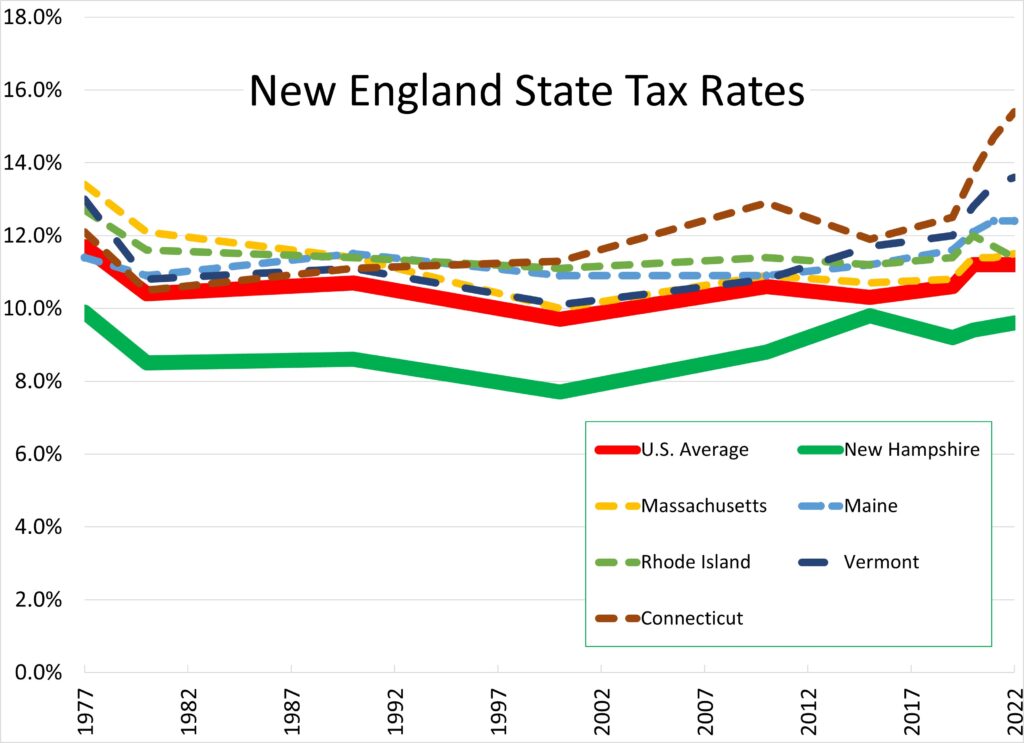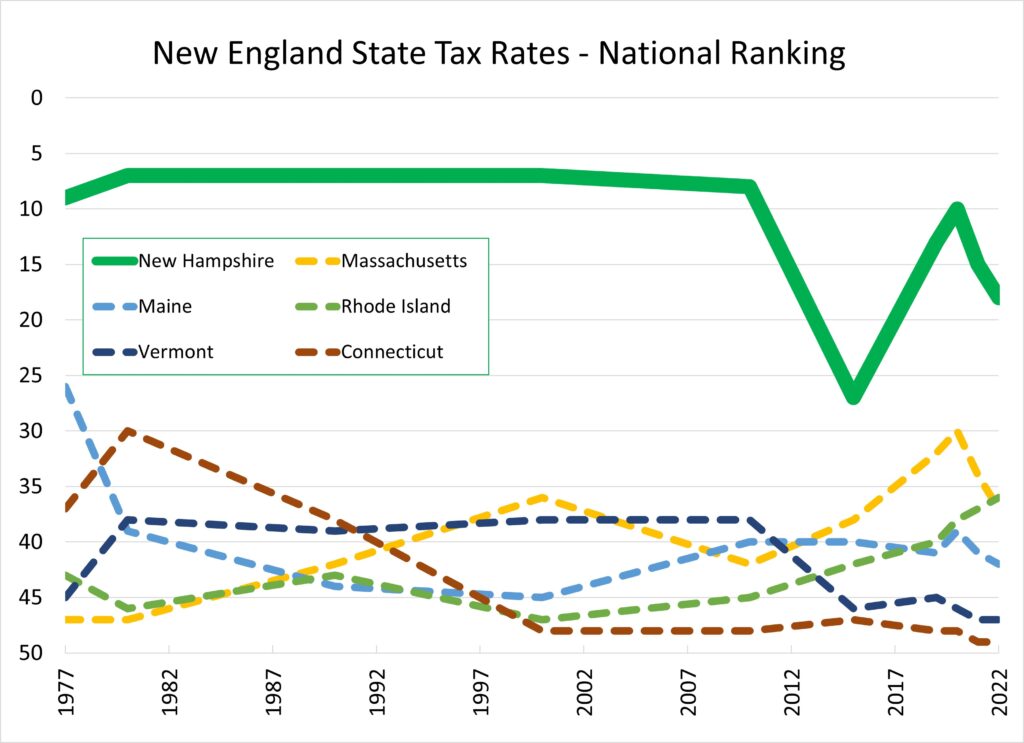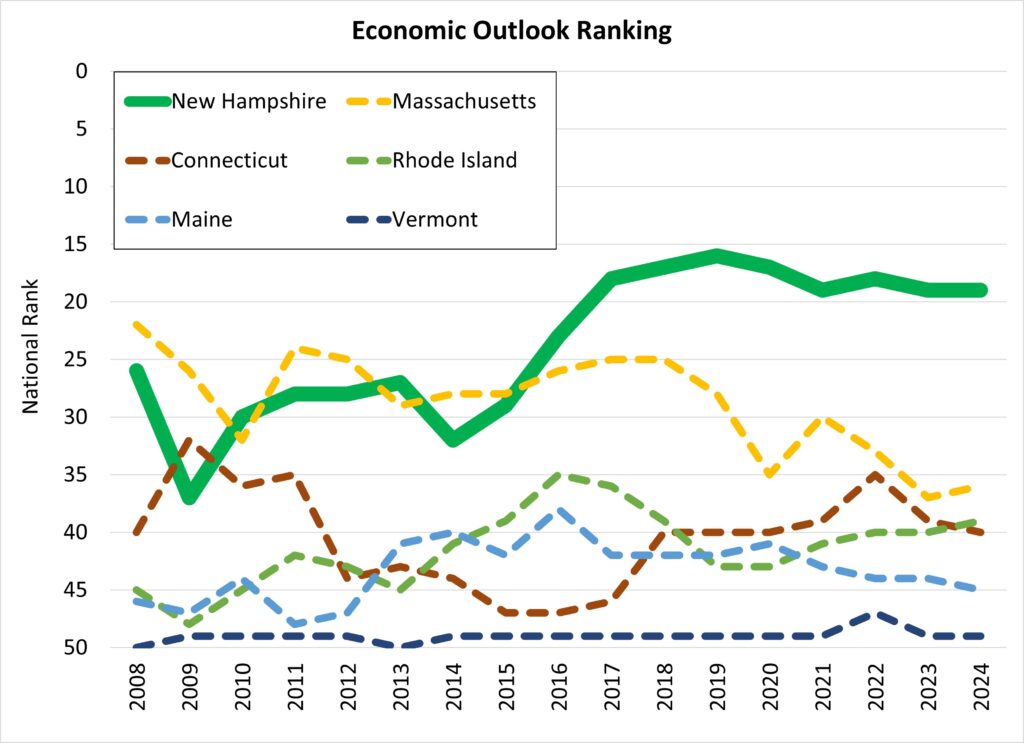Looking at the six New England states, New Hampshire has a long record of strong economic performance compared to our immediate neighbors. Why is this? Low taxes are a big part of the reason. Let’s see how we compare to our fellow New Englanders.
The chart below shows statistics from the non-partisan Tax Foundation. They measure State Tax Burden. In their analysis, “burden” measures all state taxes encumbered by the citizens of a state. It includes cross-border taxation. Thus, a New Hampshire citizen working in Massachusetts and paying Massachusetts State Income taxes increases the New Hampshire state tax burden. Conversely, a Massachusetts resident who owns a vacation home in New Hampshire and pays property taxes here decreases the New Hampshire state tax burden.
Looking back over the past 50 years, you can see New Hampshire’s tax burden is consistently lower than the national average and is considerably lower than the other five New England states.

Now let’s see how we look nationwide.
How does our tax burden compare to the other 49 states? In the past, very favorably. Lately, not so well, but we’re improving.
In this next chart, the non-partisan Tax Foundation ranks all the states. The number 1 state has the lowest tax burden, and the number 50 state has the highest tax burden. For many years, we were in the top 10 nationally. Unfortunately, we slipped quite a bit at the end of the “20-oughts”, falling into the lower half. We began a reversal in 2010 but have yet to regain our ranking in the top 10.
Note that our New England neighbors are generally among the 15 highest tax burden states in the country.

You might ask: “So what? What is the impact of a low tax state burden? Why does it matter?”
The answer: a low state tax burden translates to a favorable economic outlook.
Low state taxes:
– Encourage established New Hampshire business to grow.
– Attract new business to the state.
– Allow New Hampshire workers to keep more of their money, which they can spend as they see fit. This helps New Hampshire businesses because people have more money to spend in local stores and restaurants, or maybe make home improvements.
To compare New Hampshire’s economic outlook to our neighbors, we’ll rely on data from the American Legislative Exchange Council’s State Economic Competitive Index. This index is published annually by award-winning economists Dr. Art Laffer, Stephen Moore, and Jonathan Williams. Again, states are ranked, where the number 1 state has the most favorable economic outlook, and the number 50 state has the worst. State tax burden figures heavily in their calculations, as well as a variety of other influences such as the state debt level, the size of the public sector workforce, and the stability of the state tax code.
Although this data only goes back to 2008, you can see that New Hampshire began in the lower half of the country but moved into the Top 20 in 2017. We are now the highest ranked state in New England.

Clearly New Hampshire has a strong track record of low taxes and strong economic performance compared to our immediate neighbors.
Why is this? Looking at the table below, you can see that we are the only New England state that has been able to maintain Republican control of our legislature most of the time. Since state spending originates in the Legislature, control of the State House and Senate is the most important factor in keeping state spending low. Low spending, in turn, translates to lower state taxes. And lower taxes equal a stronger economic outlook.

Let’s end with a few conclusions while we look at the table.
First, remember how our state slipped quite a bit economically around 2008? That was during a period of Democrat control of the Governorship and both chambers in Concord. (n.b. it didn’t take them very long to start the slide, either!) Restoration of Republican majority in the Legislature in 2011 started turning things around, and things really got better with Republican Governor Sununu after 2017.
Second, look at Connecticut, Rhode Island, and Massachusetts. Although all three of those states have had long periods with Republican governors, often as much as half the time, this appears to have little impact on improving the dismal economic outlook of those states. Control of the corner office did not bring them out of the cellar.
Finally, let’s examine Vermont, a state like New Hampshire in many ways, as a cautionary tale. Once the Republicans lost control of the Legislature in the mid-1980’s, the state has not been able to recover, and its economic outlook consistently ranks among the lowest states in the country.
To be clear, Republican control of both the New Hampshire State House and Senate is absolutely vital to keep New Hampshire on track.
Vote for common sense – Vote Republican!

Sources:
